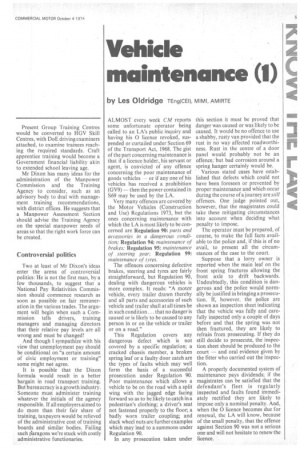Vehicle maintenance (1)
Page 53

If you've noticed an error in this article please click here to report it so we can fix it.
by Les Oldridge TEng(CEI) MIMI AMIRTE ALMOST every week CM reports some unfortunate operator being called to an LA's public inquiry and having his 0 licence revoked, suspended or curtailed under Section 69 of the Transport Act, 1968. The gist of the part concerning maintenance is that if a licence holder, his servant or agent, is convicted of any offence concerning the poor maintenance of goods vehicles — or if any one of his vehicles has received a prohibition (GV9) — then the power contained in S69 may be used by the LA.
Very many offences are covered by the Motor Vehicles (Construction and Use) Regulations 1973, but the ones concerning maintenance with which the LA is most likely to be concerned are Regulation 90: parts and accessories in a dangerous condition; Regulation 94: maintenance qf brakes; Regulation 95: maintenance . steering gear; Regulation 99: maintenance of tyres.
The offences concerning defective brakes, steering and tyres are fairly straightforward, but Regulation 90, dealing with dangerous vehicles is more complex. It reads: "A motor vehicle, every trailer drawn thereby and all parts and accessories of such vehicle and trailer shall at all times be in such condition. .. that no danger is caused or is likely to be caused to any person in or on the vehicle or trailer or on a road."
This Regulation covers any dangerous defect which is not covered by a specific regulation; a cracked chassis member, a broken spring leaf or a faulty door catch are the types of faults which may well form the basis of a successful prosecution under Regulation 90. Poor maintenance which allows a vehicle to be on the road with a split wing with the jagged edge facing forward so as to be likely to catch in a pedestrian's clothing; a driver's seat not fastened properly to the floor; a badly worn trailer coupling; and slack wheel nuts are further examples which may lead to a summons under Regulation 90.
In any prosecution taken under this section it must be proved that danger was caused or was likely to be caused. It would be no offence to use a shabby, rusty van provided that the rust in no way affected roadworthiness. Rust in the centre of a door panel would probably not be an offence; but bad corrosion around a spring hanger certainly would be.
Various stated cases have established that defects which could not have been foreseen or prevented by proper maintenance and which occur during the course of a journey are stilt offences. One judge pointed out, however, that the magistrates could take these mitigating circumstances into account when deciding what penalty to impose.
The operator must be prepared, of course, to make the full facts available to the police and, if this is of no avail, to present all the circumstances of the case to the court.
Suppose that a lorry owner is reported when the main leaf on the front spring fractures allowing the front axle to drift backwards. Undoubtedly, this condition is dangerous and the police would normally be justified in bringing a prosecution. If, however, the police are shown an inspection sheet indicating that the vehicle was fully and carefully inspected only a couple of days before and that the spring was not then fractured, they are likely to refrain from prosecuting. If they do still decide to prosecute, the inspection sheet should be produced to the court — and oral evidence given by the fitter who carried out the inspection.
A properly documented system of maintenance pays dividends; if the magistrates can be satisfied that the defendant's fleet is regularly inspected and faults found immediately rectified they are likely to impose only a nominal penalty. And, when the 0 licence becomes due for renewal, the LA will know, because of the small penalty, that the offence against Section.90 was not a serious one and will not hesitate to renew the licence.












































































































